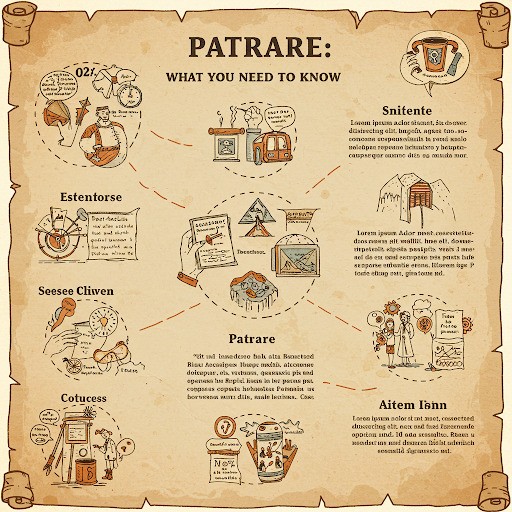The Latin language has given rise to many powerful and meaningful words, and one of those is patrare. Though not commonly heard in daily conversations, especially outside the realm of Latin studies, It has had a lasting impact on both classical literature and modern languages, especially English. In this article, we will take a deep dive into the meaning, origin, grammatical structure, and usage of this word, written in simple and clear English for easy understanding.
What Does ‘Patrare’ Mean?
In its most basic sense, patrare means “to accomplish” or “to bring something to completion.” It comes from the Latin verb patrō, and it is its present active infinitive form. That means it’s used to express the action of accomplishing something, much like how we use “to accomplish” in English.
For example:
- Nōn possum patrāre hoc opus.
- Translation: “I cannot accomplish this work.”
This verb can be used in many formal or serious contexts, such as completing a task, finishing a mission, or fulfilling a promise.
Forms and Grammar
Infinitive Form
The form pat-rare is what’s known as the present active infinitive in Latin. Just like how in English we say “to eat,” “to go,” or “to write,” Latin uses infinitives to describe the action in a general or abstract way. In this case, it means “to accomplish.”
Passive Usage
Interestingly, it also appears as a form in passive voice. It functions as the second-person singular present passive imperative, which is a fancy way of saying it can be used to give a command like “let it be accomplished” to one person.
This kind of use was common in Roman legal or religious language. For example:
- Patrare iussa!
- Translation: “Let the orders be accomplished!”
So, although it might seem strange at first, the same form this can act as both an infinitive and a passive command, depending on how it’s used in a sentence.
Principal Parts and Conjugation of Patrō
In Latin, verbs are often listed using their four principal parts. These are:
- patrō – “I accomplish” (present active)
- patrare – “to accomplish” (present infinitive)
- patrāvī – “I accomplished” (perfect)
- patrātum – “accomplished” or “in order to accomplish” (supine form)
Knowing these four forms helps Latin students understand how to build all the tenses of a verb. Here’s how it is conjugated in the present tense:
Present Tense Conjugation
| Person | Active | Passive |
|---|---|---|
| 1st singular | patrō | patror |
| 2nd singular | patrās | patrāris |
| 3rd singular | patrat | patrātur |
| 1st plural | patrāmus | patrāmur |
| 2nd plural | patrātis | patrāminī |
| 3rd plural | patrant | patrantur |
As seen in this chart, Latin verbs change their endings based on who is doing the action and whether the verb is active or passive.
Origins and Etymology
The word comes from the Latin verb patrō, which in turn has roots in the Proto-Indo-European word pəter- (meaning “father” or “protector”). The idea was that to accomplish or bring something to completion was an action tied to leadership, often associated with a fatherly role in ancient cultures.
Over time, it developed into a verb that emphasized the idea of finishing or bringing something to fulfillment, whether that was a ritual, a task, or an act of justice.
Connection to Modern Words
One of the most interesting things about this is how it influenced modern English vocabulary. The word perpetrate in English comes directly from Latin perpetrāre, which itself is formed by combining the prefix per- (meaning “through” or “completely”) with pat-rare.
So when you hear someone say, “He perpetrated a crime,” they are using a word that originally meant “to fully accomplish” something—though now the meaning has shifted to mean something more negative.
Usage in Roman Literature and History
In classical texts, it often appears in formal or serious contexts, such as legal texts, religious rituals, and historical accounts. Roman writers used this verb to express the completion of duties, victories, sacrifices, and more.
For example:
- Ritūs patrāre – “To perform (or accomplish) the rituals.”
- Vōtum patrāre – “To fulfill a vow.”
The verb’s association with duty and completion made it suitable for use in matters of state and ceremony.
Derivatives and Related Forms
Like most Latin verbs, it has many related forms and can be adapted to fit different grammatical roles in a sentence. Here are some of the most common derivatives:
- patrāvisse – Perfect infinitive, meaning “to have accomplished.”
- patrandus, -a, -um – Gerundive form, meaning “that which must be accomplished.”
- patrātum – Supine form, used with verbs of motion to express purpose (e.g., venit patrātum bellum – “He came to accomplish the war.”)
- patrātus, -a, -um – Perfect passive participle, meaning “having been accomplished.”
- patrātiō – A noun meaning “a bringing to completion.”
These variations allowed Latin writers to use this word in poetry, law, and everyday documents.
Influence on Romance Languages
While this word itself didn’t survive directly in modern Romance languages like Spanish, Italian, or French, its meaning and derivatives influenced verbs that deal with performing, doing, or completing something.
For example:
- In Italian: perpetrare – to perpetrate
- In Spanish: perpetrar – to carry out (usually a crime)
- In French: perpétrer – to commit (a crime)
These verbs carry the original idea of “bringing something to completion,” but in modern use they often refer to criminal or negative actions, just like the English word “perpetrate.”
Helpful Online Tools and Resources
If you’re curious to see how it was used in actual Roman texts or want to learn more about Latin verbs, here are some great online tools:
- Wiktionary – Offers definitions, conjugations, and etymology.
- Perseus Digital Library – Search for how this verb was used in ancient Roman works.
- Cactus2000 Conjugator – Gives full conjugation tables for Latin verbs.
- Online Etymology Dictionary – Great for finding out how Latin words influenced English.
- The Latin Library – Provides access to classical texts in Latin.
These resources are useful whether you’re a student of Latin or just someone curious about language history.
Conclusion
Though small and seemingly simple, the Latin word patrare carries deep meaning. It describes the action of completing something, of fulfilling a duty or bringing a task to its final stage. As both an infinitive and passive imperative, it shows the flexibility of Latin verbs. And through its influence on English words like “perpetrate,” it reminds us that ancient languages are still with us today.
If you’re exploring Latin grammar, studying classical literature, or just fascinated by words and their history, this word is a powerful example of how language evolves and endures across centuries. Whether used in Roman law, poetry, or religion, it continues to echo the age-old human goal: to bring things to completion.















